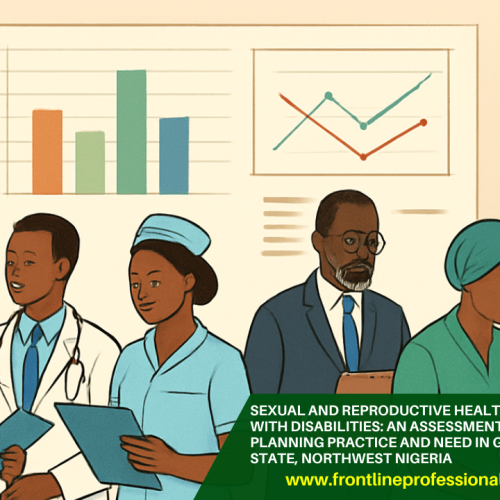Authors: Athena West Renner, Chiejine Gibson Ifechukwude, Isenalumhe Ade Salami, Afekhobe Jedidiah B. S, Ogbiti Mark Imhonikhe, Collins Chimezie Onyeocha Alutu and Duluora Nneka Chidimma
Citation: Athena West Renner, Chiejine Gibson Ifechukwude, Isenalumhe Ade Salami, Afekhobe Jedidiah B. S, Ogbiti Mark Imhonikhe, Collins Chimezie Onyeocha Alutu and Duluora Nneka Chidimma (2025). Knowledge, attitude, and contraceptive use among post-partum women attending the post-natal clinic of a model primary healthcare centre in Nigeria. Frontline Professionals Journal 2(4), 10 – 18
ABSTRACT
Background of study: Family planning is a positive health attribute that benefits the pregnancy, child, the father, the mother, and society, yet it is not adequately utilised, especially in developing countries. The study aimed to assess the knowledge, attitude and contraceptive use among post-partum women.
Methodology: A facility-based cross-sectional research in a Model Primary Healthcare Centre, located in Ozuoba, Rivers State, was carried out. Four hundred post-natal women participated in the study and were sampled by a simple random sampling technique. Interviewer interviewer-administered questionnaire was used to collect data after written informed consent was obtained from the participants.
Results: The mean age of the respondents was 30.1(±6.2). The percentage of post-partum women who know about family planning was 97.8%. The major sources of information were the hospital (63.0%), Friends and relatives (18.0%), and the mass media (13.8%). The percentage of good attitudes toward family planning was 32.8%. The prevalence of the utilisation of family planning was 57.6%. The most common family planning services used were implants (31.0%), injectables (20.3%), exclusive breastfeeding (18.5%) and safe period (11.5%). The factors that were significantly associated with family planning were the age of the women, the occupation of the woman, and the number of children in the household, and the educational status of the husband.
Conclusion: The major reasons for practicing family planning were child spacing, economic reasons, and husband approval. The major deterrents to family planning utilization were the fear of side effects, wanting more children, husband’s disapproval, and religious barriers. Achieving maximum utilization of family planning is indispensable, and it requires a holistic approach at the individual, health facility, community, government, and non-governmental levels.
Keywords: family planning, contraceptives, post-partum women, health facility, knowledge







